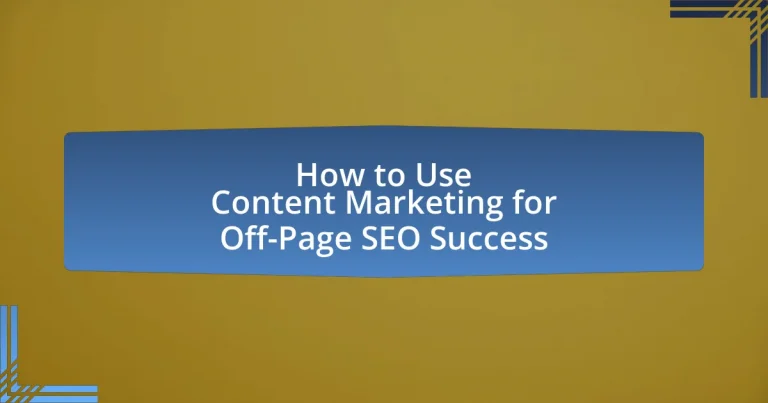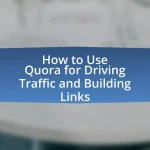Content marketing is a strategic approach that involves creating and distributing valuable content to engage a target audience and drive profitable actions. Its significance in off-page SEO is highlighted by its ability to enhance brand visibility, generate backlinks, and improve social media engagement, all of which contribute to higher search engine rankings. The article explores how content marketing influences off-page SEO strategies, the key elements that impact SEO performance, and the importance of high-quality content in attracting backlinks. Additionally, it discusses effective content types, promotion strategies, and metrics for measuring success, providing a comprehensive guide for leveraging content marketing to achieve off-page SEO success.
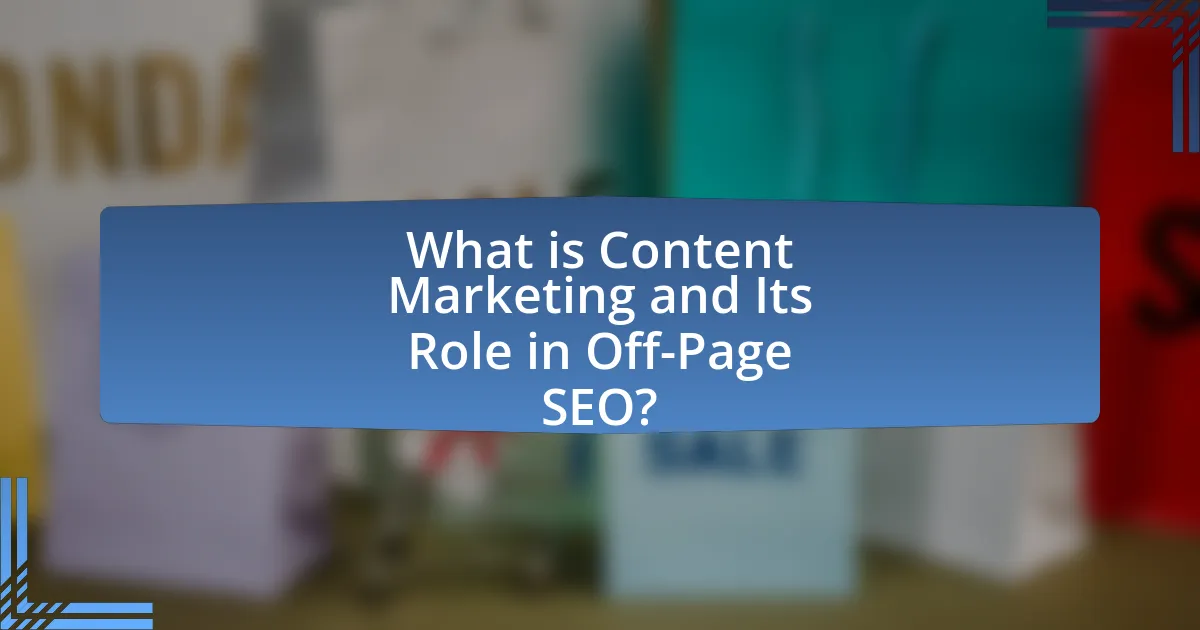
What is Content Marketing and Its Role in Off-Page SEO?
Content marketing is the strategic creation and distribution of valuable, relevant content to attract and engage a target audience, ultimately driving profitable customer action. Its role in off-page SEO is significant, as high-quality content can enhance brand visibility, generate backlinks, and improve social media engagement, all of which contribute to higher search engine rankings. For instance, according to a study by HubSpot, companies that prioritize blogging are 13 times more likely to achieve a positive ROI, demonstrating the effectiveness of content marketing in enhancing off-page SEO efforts.
How does content marketing influence off-page SEO strategies?
Content marketing significantly influences off-page SEO strategies by enhancing brand visibility and generating backlinks. High-quality content attracts external websites to link back, which improves domain authority and search engine rankings. For instance, a study by Moz indicates that backlinks are a major ranking factor, with sites that have a higher number of quality backlinks often ranking better in search results. Additionally, engaging content encourages social sharing, further amplifying reach and potential link-building opportunities. This interconnectedness between content marketing and off-page SEO demonstrates that effective content strategies are essential for improving overall search engine performance.
What are the key elements of content marketing that impact off-page SEO?
The key elements of content marketing that impact off-page SEO include high-quality backlinks, social media engagement, and content distribution. High-quality backlinks from authoritative websites enhance domain authority and improve search engine rankings, as evidenced by a study from Moz indicating that backlinks are a significant ranking factor. Social media engagement amplifies content reach and drives traffic, with research from HubSpot showing that 54% of marketers prioritize social media for content promotion. Lastly, effective content distribution across various platforms increases visibility and encourages user interaction, which can lead to more backlinks and improved SEO performance.
How does content quality affect off-page SEO performance?
Content quality significantly impacts off-page SEO performance by influencing link-building opportunities and social sharing. High-quality content is more likely to attract backlinks from authoritative websites, as other content creators and publishers prefer to link to valuable and informative resources. According to a study by Moz, pages with higher quality content receive more backlinks, which are a critical factor in search engine ranking algorithms. Additionally, engaging content encourages social media sharing, further amplifying visibility and driving traffic, which can enhance overall SEO performance.
Why is off-page SEO important for overall digital marketing success?
Off-page SEO is crucial for overall digital marketing success because it enhances a website’s authority and visibility through external factors like backlinks and social signals. These elements contribute to higher search engine rankings, which directly influence organic traffic. For instance, a study by Moz indicates that backlinks are one of the top three ranking factors for Google, demonstrating their significant impact on search visibility. Additionally, off-page SEO fosters brand awareness and credibility, as a strong backlink profile from reputable sites signals trustworthiness to both users and search engines. This multifaceted approach ultimately drives more qualified leads and conversions, solidifying its importance in a comprehensive digital marketing strategy.
What are the main components of off-page SEO?
The main components of off-page SEO include backlinks, social media engagement, and brand mentions. Backlinks are links from other websites that point to your site, which signal authority and relevance to search engines; studies show that higher-quality backlinks correlate with better search rankings. Social media engagement involves sharing content and interacting with users on platforms like Facebook and Twitter, which can drive traffic and enhance visibility. Brand mentions, whether linked or unlinked, contribute to brand awareness and can influence search engine perception of credibility. Each of these components plays a crucial role in improving a website’s authority and search engine ranking.
How does off-page SEO contribute to website authority and ranking?
Off-page SEO significantly enhances website authority and ranking by building credibility through external signals such as backlinks, social media engagement, and brand mentions. Backlinks from reputable sites act as endorsements, indicating to search engines that the content is valuable and trustworthy, which can lead to higher rankings. For instance, a study by Moz found that backlinks are one of the top three ranking factors in Google’s algorithm, demonstrating their critical role in establishing authority. Additionally, social media shares and interactions can amplify content reach, driving traffic and increasing visibility, which further contributes to improved rankings.
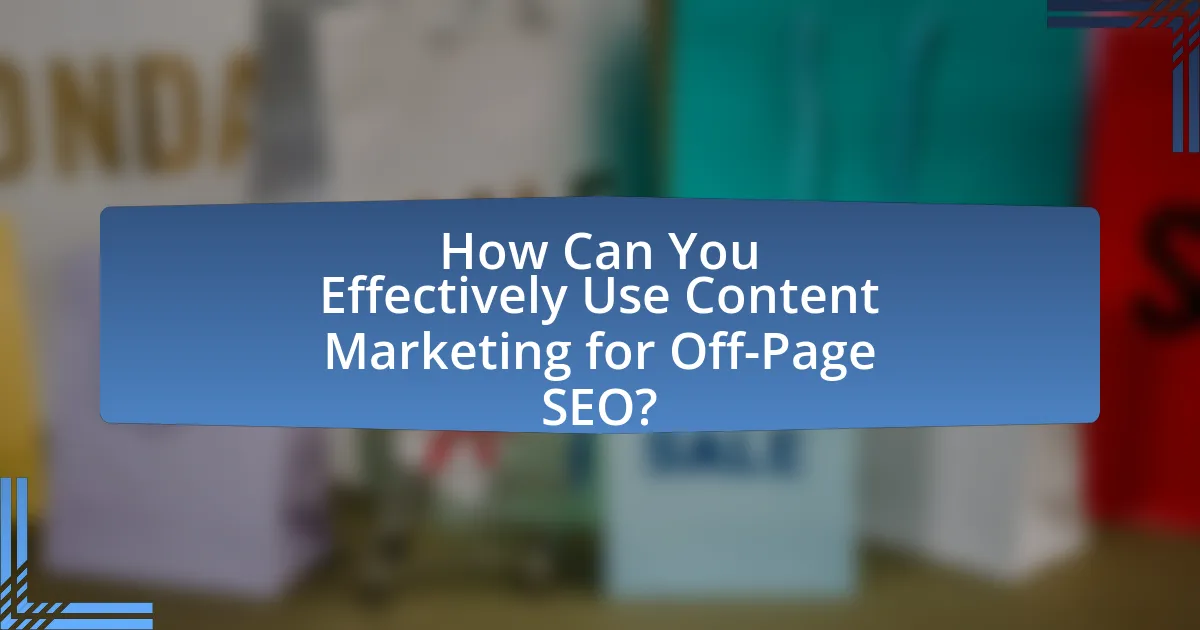
How Can You Effectively Use Content Marketing for Off-Page SEO?
To effectively use content marketing for off-page SEO, create high-quality, shareable content that attracts backlinks from authoritative websites. This approach enhances your site’s credibility and visibility in search engine results. For instance, research shows that websites with a strong backlink profile can rank significantly higher; a study by Moz indicates that backlinks are one of the top three ranking factors in Google’s algorithm. Additionally, promoting content through social media and influencer partnerships can further amplify reach and engagement, leading to increased traffic and improved SEO performance.
What types of content are most effective for off-page SEO?
The most effective types of content for off-page SEO include guest posts, infographics, and videos. Guest posts allow for backlinks from reputable sites, enhancing domain authority and visibility. Infographics are highly shareable and can attract backlinks due to their visual appeal and informative nature. Videos engage users and can be shared across multiple platforms, increasing reach and potential backlinks. According to a study by Backlinko, websites with video content are 53 times more likely to rank on the first page of Google, demonstrating the effectiveness of video in off-page SEO strategies.
How do blog posts enhance off-page SEO efforts?
Blog posts enhance off-page SEO efforts by generating backlinks, increasing brand visibility, and fostering social sharing. When high-quality blog content is published, it attracts links from other websites, which are crucial for improving search engine rankings. According to a study by Moz, backlinks are one of the top three ranking factors for Google, demonstrating their importance in off-page SEO. Additionally, engaging blog posts can be shared across social media platforms, amplifying reach and driving traffic to the website, further enhancing its authority and relevance in search engines.
What role do infographics play in off-page SEO strategies?
Infographics play a crucial role in off-page SEO strategies by enhancing link-building opportunities and increasing content shareability. Their visual appeal attracts attention, making them more likely to be shared across social media platforms and linked to by other websites. According to a study by HubSpot, content with relevant images gets 94% more views than content without images, highlighting the effectiveness of visual content in driving engagement and backlinks. This increased visibility and engagement can significantly improve a website’s authority and search engine ranking.
How can you promote your content to boost off-page SEO?
To promote your content and boost off-page SEO, leverage social media platforms to share your content widely. Engaging with audiences on platforms like Facebook, Twitter, and LinkedIn increases visibility and encourages shares, which can lead to backlinks. According to a study by BuzzSumo, content shared on social media receives 3 times more backlinks than content that is not shared. Additionally, guest blogging on reputable sites allows you to reach new audiences and earn backlinks, enhancing your site’s authority. Research from Moz indicates that backlinks are a significant ranking factor in search engine algorithms, making this strategy effective for off-page SEO.
What are the best practices for sharing content on social media?
The best practices for sharing content on social media include creating engaging visuals, optimizing post timing, and utilizing relevant hashtags. Engaging visuals, such as images and videos, increase user interaction by up to 94%, making content more shareable. Optimizing post timing ensures that content reaches the audience when they are most active; studies show that posts made during peak hours receive significantly higher engagement rates. Additionally, using relevant hashtags can expand the content’s reach, as posts with at least one hashtag can increase engagement by 12.6%. These practices collectively enhance visibility and interaction, contributing to successful content marketing strategies for off-page SEO.
How can guest blogging improve your off-page SEO?
Guest blogging can significantly improve off-page SEO by enhancing backlink profiles and increasing domain authority. When a guest post is published on a reputable site, it often includes a link back to the author’s website, which search engines recognize as a vote of confidence. This practice not only drives referral traffic but also helps in building credibility and authority in the niche. According to a study by Moz, backlinks are one of the top three ranking factors for search engines, underscoring the importance of acquiring high-quality links through guest blogging. Additionally, guest blogging allows for exposure to new audiences, which can lead to increased brand awareness and potential customer engagement, further supporting off-page SEO efforts.
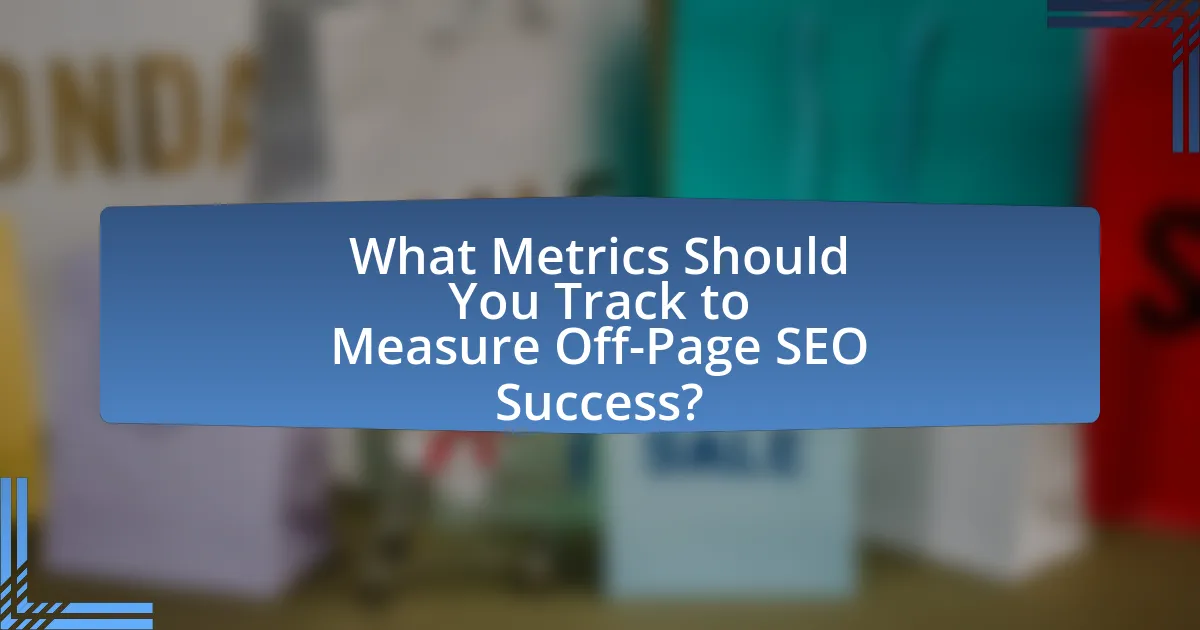
What Metrics Should You Track to Measure Off-Page SEO Success?
To measure off-page SEO success, track metrics such as backlink quality, referral traffic, domain authority, and social media engagement. Backlink quality indicates the strength and relevance of links pointing to your site, which directly impacts search engine rankings. Referral traffic measures the number of visitors coming from external sources, reflecting the effectiveness of your off-page strategies. Domain authority, a score developed by Moz, assesses the overall strength of your website in comparison to competitors, influencing your visibility in search results. Social media engagement metrics, including shares, likes, and comments, demonstrate how well your content resonates with audiences and can drive traffic back to your site. These metrics collectively provide a comprehensive view of your off-page SEO performance.
How do backlinks influence your off-page SEO performance?
Backlinks significantly enhance off-page SEO performance by improving a website’s authority and visibility in search engine results. When reputable websites link to your content, search engines interpret this as a vote of confidence, which can lead to higher rankings. According to a study by Moz, backlinks are one of the top three ranking factors for Google, indicating their critical role in SEO. Furthermore, a report from Ahrefs shows that 91% of web pages do not receive organic traffic from Google, primarily due to a lack of backlinks, underscoring their importance in driving traffic and improving overall SEO effectiveness.
What tools can help you analyze your backlink profile?
Tools that can help analyze your backlink profile include Ahrefs, SEMrush, Moz, and Majestic. Ahrefs provides a comprehensive backlink analysis with metrics like Domain Rating and URL Rating, allowing users to evaluate the strength of their backlinks. SEMrush offers a Backlink Audit tool that identifies toxic links and provides insights into competitors’ backlink strategies. Moz features a Link Explorer that helps users discover new link opportunities and track their link-building efforts. Majestic specializes in backlink analysis with its Trust Flow and Citation Flow metrics, which assess the quality and quantity of backlinks. These tools are widely recognized in the SEO community for their effectiveness in analyzing and improving backlink profiles.
How can you assess the quality of backlinks?
To assess the quality of backlinks, evaluate their relevance, authority, and trustworthiness. Relevance refers to how closely the linking site’s content aligns with your own, which enhances the contextual value of the link. Authority can be measured using metrics such as Domain Authority (DA) or Page Authority (PA), which indicate the site’s credibility and influence in its niche. Trustworthiness can be assessed through the site’s history, including its spam score and whether it has been penalized by search engines. Tools like Moz, Ahrefs, and SEMrush provide these metrics, allowing for a comprehensive analysis of backlink quality.
What other metrics are important for evaluating content marketing effectiveness?
Key metrics for evaluating content marketing effectiveness include engagement rate, conversion rate, organic traffic, and social shares. Engagement rate measures how well content resonates with the audience, often indicated by likes, comments, and shares. Conversion rate tracks the percentage of users who take a desired action, such as signing up for a newsletter or making a purchase, reflecting the content’s ability to drive business goals. Organic traffic indicates the number of visitors arriving from search engines, showcasing the content’s SEO performance. Social shares quantify how often content is shared across social platforms, indicating its reach and popularity. These metrics collectively provide a comprehensive view of content marketing success and its impact on off-page SEO.
How does social engagement impact off-page SEO metrics?
Social engagement significantly enhances off-page SEO metrics by increasing brand visibility and driving traffic to websites. When users interact with content on social media platforms, it generates shares, likes, and comments, which can lead to higher referral traffic. According to a study by BuzzSumo, content that receives more social shares tends to rank higher in search engine results, indicating a correlation between social engagement and improved SEO performance. Additionally, social signals can influence search engine algorithms, as platforms like Google may consider the popularity of content on social media as a factor in ranking decisions. Thus, active social engagement not only boosts direct traffic but also contributes to better overall search engine visibility.
What role does referral traffic play in measuring success?
Referral traffic is a critical metric in measuring success as it indicates the effectiveness of content marketing strategies in driving visitors from external sources to a website. This type of traffic reflects the ability of content to engage audiences beyond the site itself, showcasing brand visibility and authority. For instance, a study by HubSpot found that websites with higher referral traffic often experience increased conversion rates, demonstrating that effective content marketing can lead to tangible business outcomes. Additionally, referral traffic can enhance search engine rankings, as search engines view it as a sign of credibility and relevance, further validating its role in assessing overall success.
What are some best practices for integrating content marketing with off-page SEO?
Best practices for integrating content marketing with off-page SEO include creating high-quality, shareable content that naturally attracts backlinks, leveraging social media platforms to promote content and engage with audiences, and collaborating with influencers to expand reach and credibility. High-quality content, such as informative blog posts or engaging videos, encourages other websites to link back, enhancing domain authority. Research indicates that content shared on social media generates 31% more traffic, demonstrating the importance of social engagement in driving off-page SEO success. Additionally, partnerships with influencers can lead to increased visibility and backlinks, as their endorsements often carry significant weight in their respective niches.
How can you create a cohesive strategy that aligns content marketing and off-page SEO?
To create a cohesive strategy that aligns content marketing and off-page SEO, integrate content creation with link-building efforts. This involves producing high-quality, shareable content that naturally attracts backlinks from authoritative websites. For instance, research by Moz indicates that content quality significantly influences link acquisition, with 70% of marketers stating that content marketing is their primary strategy for link-building. By focusing on creating valuable resources, such as infographics, case studies, or in-depth articles, businesses can enhance their off-page SEO through increased visibility and engagement, leading to more backlinks and improved search rankings.
What common mistakes should you avoid in your content marketing efforts for off-page SEO?
Common mistakes to avoid in content marketing for off-page SEO include neglecting quality backlinks, failing to engage with the audience, and not optimizing for shareability. Neglecting quality backlinks can harm your site’s authority; studies show that high-quality backlinks significantly improve search rankings. Failing to engage with the audience leads to missed opportunities for interaction and brand loyalty, as engagement metrics are crucial for SEO performance. Not optimizing content for shareability limits its reach; research indicates that content designed for easy sharing can increase visibility and drive traffic, enhancing off-page SEO efforts.
